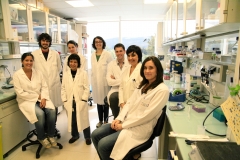2013/09/11
EU allocates €1.5m funding to Arkaitz Carracedo's prostate cancer research project
- The European Research Council has given the CIC bioGUNE researcher an ERC Starting Grant, aimed at young researchers, to study the diagnosis and treatment of the most common cancer in men.
- The research will focus on discovering more about the influence of people's diet on the behaviour of prostate cancer cells.
- The project awarded to Carracedo is one of four allocated in Spain, and the only one in the Basque Country, to researchers who work in the field of health sciences.
Prostate cancer is one of the most common cancers in men in developed countries, even more than lung cancer. It accounts for 13.5% of all tumours in men and around one million new cases are diagnosed every year in the world. Therefore, prostate cancer has become one of the focus of cancer researchers nowadays. Interestingly, several studies have associated the incidence and aggressiveness of this disease to genetic, hormonal and environmental factors.
In this sense, Ikerbasque researcher from CIC bioGUNE (Center for Cooperative Research in Bioscience) Arkaitz Carracedo has been awarded an ERC Starting Grant, one of the most prestigious scientific projects that the European Research Council (ERC) gives to young researchers. The ERC has granted Carracedo 1.5 million euros to ascertain the link between cellular and organism nutrition and prostate cancer.
The project awarded to Carracedo is one of four awarded in Spain (and the only one in the Basque Country) to health sciences researchers (108 in Europe) as part of the ERC Starting Grant 2013 programme, and it is one of fourteen that the Europe Research Council has awarded to Spanish scientists of all specialities (two in the Basque Country).
- Obesity and prostate cancer
The project that Dr Carracedo is going to undertake on "Metabolic requirements for prostate cancer cell fitness" is based on understanding the impact of diet in cells as well as the whole individual, and in turn the behaviour of prostate cancer. Carracedo and his team believe that if the nutritional and metabolic bases of tumours are understood, it can help to improve prostate cancer prevention, detection and treatment.
The aims of this research, which will take place over the next five years, are to understand the metabolic factors that link obesity with prostate cancer, to define better markers to diagnose the disease, and to identify the most relevant aspects of metabolism in tumour cells in order to develop more effective therapies.
For decades, scientists have known that cancer cells do not use nutrients in the same way as healthy cells, as they concentrate their entire metabolism on reproduction and spreading, unlike normal cells, which dedicate metabolism to the generation of energy to sustain core functions. Carracedo's research takes this phenomenon as the basis to study the influence of diet and overeating on the behaviour of prostate cancer cells.
- "Qualitative leap"
According to Carracedo, "this project is the result of the work my research group has been carrying out over the past few years, but it is in fact a completely new project. We aim to achieve a qualitative leap forward in the type of work we have been carrying out until now".
In view of research cuts caused by the crisis, this European funding greatly supports the scientific goals of Carracedo's laboratory at CIC bioGUNE. Amongst other things, this funding will allow up to six new researchers to join the laboratory, with training in various fields such as nutrition, stem cells and bioinformatics.
"This funding opportunity is especially important given the current research scenario in Spain. Funding initiatives like this one should be an example of how the future happens when we have invested in the past, and the importance of supporting scientific and technological excellence in order to create a better future," says Carracedo.
See a large version of the first picture

See a large version of the second picture





